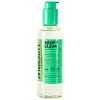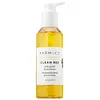What's inside
What's inside
 Key Ingredients
Key Ingredients

 Benefits
Benefits

 Concerns
Concerns

 Ingredients Side-by-side
Ingredients Side-by-side

Water
Skin ConditioningGlycerin
HumectantSodium C14-16 Olefin Sulfonate
CleansingCocamidopropyl Betaine
CleansingSodium Chloride
MaskingCeramide NP
Skin ConditioningGlucosyl Ceramide
Skin ConditioningArginine
MaskingProline
Skin ConditioningSerine
MaskingAlanine
MaskingGlycine
BufferingLysine Hcl
Skin ConditioningThreonine
Collagen
MoisturisingCentella Asiatica Extract
CleansingCucumis Sativus Fruit Extract
EmollientPyrus Malus Fruit Extract
Skin ConditioningRosa Damascena Flower Extract
MaskingCamellia Sinensis Leaf Extract
AntimicrobialBetaine
HumectantPelargonium Graveolens Extract
MaskingMelia Azadirachta Leaf Extract
Skin ConditioningCurcuma Longa Root Extract
MaskingBoerhavia Diffusa Root Extract
Skin ProtectingMelia Azadirachta Flower Extract
Skin ConditioningAlpha-Glucan
HumectantSodium PCA
HumectantPCA
HumectantPullulan
Citrus Aurantium Bergamia Fruit Oil
MaskingCitrus Nobilis Peel Oil
MaskingHydrogenated Lecithin
EmulsifyingSucrose Stearate
EmollientGlutamic Acid
HumectantPolyglyceryl-10 Stearate
Skin ConditioningSorbitan Oleate Decylglucoside Crosspolymer
CleansingDecyl Glucoside
CleansingCaprylyl Glycol
Emollient1,2-Hexanediol
Skin ConditioningButylene Glycol
HumectantSodium Lactate
BufferingSodium Lauroyl Sarcosinate
CleansingHydroxyacetophenone
AntioxidantCitric Acid
BufferingSodium Lauroyl Lactylate
EmulsifyingSodium Phytate
Water, Glycerin, Sodium C14-16 Olefin Sulfonate, Cocamidopropyl Betaine, Sodium Chloride, Ceramide NP, Glucosyl Ceramide, Arginine, Proline, Serine, Alanine, Glycine, Lysine Hcl, Threonine, Collagen, Centella Asiatica Extract, Cucumis Sativus Fruit Extract, Pyrus Malus Fruit Extract, Rosa Damascena Flower Extract, Camellia Sinensis Leaf Extract, Betaine, Pelargonium Graveolens Extract, Melia Azadirachta Leaf Extract, Curcuma Longa Root Extract, Boerhavia Diffusa Root Extract, Melia Azadirachta Flower Extract, Alpha-Glucan, Sodium PCA, PCA, Pullulan, Citrus Aurantium Bergamia Fruit Oil, Citrus Nobilis Peel Oil, Hydrogenated Lecithin, Sucrose Stearate, Glutamic Acid, Polyglyceryl-10 Stearate, Sorbitan Oleate Decylglucoside Crosspolymer, Decyl Glucoside, Caprylyl Glycol, 1,2-Hexanediol, Butylene Glycol, Sodium Lactate, Sodium Lauroyl Sarcosinate, Hydroxyacetophenone, Citric Acid, Sodium Lauroyl Lactylate, Sodium Phytate
Water
Skin ConditioningSodium Lauroyl Methyl Isethionate
CleansingCocamidopropyl Hydroxysultaine
CleansingChamomilla Recutita Flower Water
MaskingDecyl Glucoside
CleansingMaltooligosyl Glucoside
Skin ConditioningLauryl Glucoside
CleansingGlycerin
HumectantHydrogenated Starch Hydrolysate
HumectantEchinacea Purpurea Root Extract
MoisturisingHoney Extract
HumectantPropolis Extract
Skin ConditioningRoyal Jelly Extract
Skin ConditioningHydrolyzed Sodium Hyaluronate
Skin ConditioningCalendula Officinalis Flower Extract
MaskingGlycyrrhiza Glabra Root Extract
BleachingAloe Barbadensis Leaf Juice
Skin ConditioningMelia Azadirachta Leaf Extract
Skin ConditioningLavandula Angustifolia Oil
MaskingLavandula Hybrida Oil
EmollientCurcumin
AntioxidantCurcuma Longa Root Extract
MaskingBetaine
HumectantSodium PCA
HumectantDisodium Cocoyl Glutamate
CleansingSodium Cocoyl Glutamate
CleansingCitric Acid
BufferingSodium Benzoate
MaskingAbies Sibirica Oil
MaskingCymbopogon Martini Oil
MaskingPelargonium Graveolens Oil
MaskingPogostemon Cablin Leaf Oil
MaskingCaramel
Cosmetic ColorantAnthemis Nobilis Flower Oil
MaskingOcimum Basilicum Flower/Leaf Extract
TonicOcimum Sanctum Leaf Extract
Skin ConditioningMelia Azadirachta Flower Extract
Skin ConditioningCorallina Officinalis Extract
Skin ConditioningAroma
Potassium Sorbate
PreservativeMaltodextrin
AbsorbentTrisodium Ethylenediamine Disuccinate
Sodium Chloride
MaskingSodium Phytate
Propanediol
SolventLinalool
PerfumingWater, Sodium Lauroyl Methyl Isethionate, Cocamidopropyl Hydroxysultaine, Chamomilla Recutita Flower Water, Decyl Glucoside, Maltooligosyl Glucoside, Lauryl Glucoside, Glycerin, Hydrogenated Starch Hydrolysate, Echinacea Purpurea Root Extract, Honey Extract, Propolis Extract, Royal Jelly Extract, Hydrolyzed Sodium Hyaluronate, Calendula Officinalis Flower Extract, Glycyrrhiza Glabra Root Extract, Aloe Barbadensis Leaf Juice, Melia Azadirachta Leaf Extract, Lavandula Angustifolia Oil, Lavandula Hybrida Oil, Curcumin, Curcuma Longa Root Extract, Betaine, Sodium PCA, Disodium Cocoyl Glutamate, Sodium Cocoyl Glutamate, Citric Acid, Sodium Benzoate, Abies Sibirica Oil, Cymbopogon Martini Oil, Pelargonium Graveolens Oil, Pogostemon Cablin Leaf Oil, Caramel, Anthemis Nobilis Flower Oil, Ocimum Basilicum Flower/Leaf Extract, Ocimum Sanctum Leaf Extract, Melia Azadirachta Flower Extract, Corallina Officinalis Extract, Aroma, Potassium Sorbate, Maltodextrin, Trisodium Ethylenediamine Disuccinate, Sodium Chloride, Sodium Phytate, Propanediol, Linalool
Ingredients Explained
These ingredients are found in both products.
Ingredients higher up in an ingredient list are typically present in a larger amount.
Betaine is a common humectant (a substance that promotes retention of moisture). It's known to be gentle on the skin and can help balance hydration.
This ingredient is best for improving hydration and soothing irritated skin. Studies also show it helps even out skin tone.
Fun fact: Betaine is naturally created in the skin and body. The kind found within cosmetic products can be either plant-derived or synthetic.
Another name for betaine is trimethylglycine.
Learn more about BetaineCitric Acid is an alpha hydroxy acid (AHA) naturally found in citrus fruits like oranges, lemons, and limes.
Like other AHAs, citric acid can exfoliate skin by breaking down the bonds that hold dead skin cells together. This helps reveal smoother and brighter skin underneath.
However, this exfoliating effect only happens at high concentrations (20%) which can be hard to find in cosmetic products.
Due to this, citric acid is usually included in small amounts as a pH adjuster. This helps keep products slightly more acidic and compatible with skin's natural pH.
In skincare formulas, citric acid can:
While it can provide some skin benefits, research shows lactic acid and glycolic acid are generally more effective and less irritating exfoliants.
Most citric acid used in skincare today is made by fermenting sugars (usually from molasses). This synthetic version is identical to the natural citrus form but easier to stabilize and use in formulations.
Read more about some other popular AHA's here:
Learn more about Citric AcidCurcuma Longa Root Extract is from the spice, turmeric. Besides being a healthy and delicious spice, turmeric also has plenty of skincare benefits. It has anti-inflammatory, antioxidant, and anti-microbial properties.
Turmeric contains curcumin, an antioxidant. Antioxidants help neutralize unstable free-radical molecules. Free-radical molecules may damage your skin's cells and DNA. Curcumin may help with anti-aging.
Curcumin also has anti-inflammatory properties and can help soothe skin and reduce irritation. On top of that, curcumin has been shown to help prevent hyperpigmentation from sun damage.
The anti-microbial property of turmeric can make it effective in treating acne. This property has also been shown to help regulate the production of sebum.
Learn more about Curcuma Longa Root ExtractDecyl Glucoside is a glucose-based surfactant and emulsion stabilizer. It is created by reacting glucose with the fatty acids from plants.
Surfactants help clean the skin by trapping oil, sebum, and dirt to be washed away. As an emulsion stabilizer, it stabilizes the ingredients in a product by preventing them from separating.
This ingredient is biodegradable and non-toxic. This ingredient is commonly found in baby shampoos.
Decyl Glucoside is sometimes used to stabilize the UV filter Tinosorb.
Learn more about Decyl GlucosideGlycerin is already naturally found in your skin. It helps moisturize and protect your skin.
A study from 2016 found glycerin to be more effective as a humectant than AHAs and hyaluronic acid.
As a humectant, it helps the skin stay hydrated by pulling moisture to your skin. The low molecular weight of glycerin allows it to pull moisture into the deeper layers of your skin.
Hydrated skin improves your skin barrier; Your skin barrier helps protect against irritants and bacteria.
Glycerin has also been found to have antimicrobial and antiviral properties. Due to these properties, glycerin is often used in wound and burn treatments.
In cosmetics, glycerin is usually derived from plants such as soybean or palm. However, it can also be sourced from animals, such as tallow or animal fat.
This ingredient is organic, colorless, odorless, and non-toxic.
Glycerin is the name for this ingredient in American English. British English uses Glycerol/Glycerine.
Learn more about GlycerinMelia Azadirachta Flower Extract is from the Neem tree. Neem trees originate from India.
Melia Azadirachta Flower Extract contains antioxidants. Antioxidants help fight free-radicals. Free-radicals are molecules that may damage your skin cells, such as pollution.
The flowers of this tree are lilac colored.
Learn more about Melia Azadirachta Flower ExtractMelia Azadirachta Leaf Extract is extract from the neem plant.
The leaves of this tree contain flavonoids and polyphenols. These two compounds are antioxidants, anti-inflammatory, and antibacterial. Further research is needed as to their effects when applied on skin.
Chances are, you eat sodium chloride every day. Sodium Chloride is also known as table salt.
This ingredient has many purposes in skincare: thickener, emulsifier, and exfoliator.
You'll most likely find this ingredient in cleansers where it is used to create a gel-like texture. As an emulsifier, it also prevents ingredients from separating.
There is much debate on whether this ingredient is comedogenic. The short answer - comedogenic ratings don't tell the whole story. Learn more about comegodenic ratings here.
The concensus about this ingredient causing acne seems to be divided. Research is needed to understand if this ingredient does cause acne.
Scrubs may use salt as the primary exfoliating ingredient.
Learn more about Sodium ChlorideSodium PCA is the sodium salt of pyroglutamic acid. It is naturally occurring in our skin's natural moisturizing factors where it works to maintain hydration.
The PCA stands for pyrrolidone carboxylic acid, a natural amino acid derivative.
This ingredient has skin conditioning, anti-inflammatory, and humectant properties. Humectants help hydrate your skin by drawing moisture from the air. This helps keep your skin moisturized.
Learn more about Sodium PCASodium Phytate is the synthetic salt form of phytic acid. Phytic acid is an antioxidant and can be found in plant seeds.
Sodium Phytate is a chelating agent. Chelating agents help prevent metals from binding to water. This helps stabilize the ingredients and the product.
Water. It's the most common cosmetic ingredient of all. You'll usually see it at the top of ingredient lists, meaning that it makes up the largest part of the product.
So why is it so popular? Water most often acts as a solvent - this means that it helps dissolve other ingredients into the formulation.
You'll also recognize water as that liquid we all need to stay alive. If you see this, drink a glass of water. Stay hydrated!
Learn more about Water